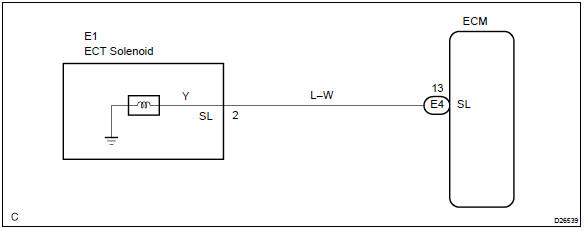Toyota Corolla (E120): Circuit description
The shift solenoid valve sl is turned ”on” and ”off” by signals from the ecm in order to control the hydraulic pressure operation, the lock–up relay valve, which then the controls operation of the lock–up clutch.
Fail safe function: if the ecm detects a malfunction, it turns the shift solenoid valve sl off.

Monitor description
Based on the signals from the throttle position sensor, the airflow meter and the crankshaft position sensor, the ecm sends a signal to the sl solenoid valve to regulate the hydraulic pressure and provide smoother gearshifts. The shift–solenoid valve sl responds to commands from the ecm. The valve controls the lock–up relay valve to perform the torque–converter lock–up function. If the ecm detects an open or short circuit for shift–solenoid sl, it will illuminate the mil.
Monitor strategy

Typical enabling condition

Typical malfunction thresholds

Component operating range

Wiring diagram

Other materials:
Inspection procedure
Hint:
if dtcs p0115, p0116, p0117, p0118 and p0125 are output
simultaneously, the engine coolant temperature
sensor circuit may be open or short. Perform the troubleshooting of dtc
p0115, p0117 or
p0118 first.
Read freeze frame data using the hand-held tester or the obd ii scan
to ...
Diagnostic trouble code chart
If a dtc is displayed during the dtc check, check the circuit listed in the
table below and proceed to the
page given.
* :● ... Mil light up
...
Keys
The following keys are provided
with the vehicle.
Type A
Keys (without a wireless
remote control function)
Key number plate
Type B
Keys (with a wireless remote
control function)
Operating the wireless remote control
function
Key number plate
Type C
Electronic keys
Operating the sm ...


